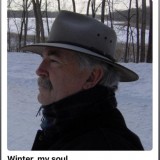Syntuit: On the Construction of a new poem form
-
Larry Chamberlin
10 years agoI have become dissatisfied with the limitations of the pure Haiku and Senryu forms. Their purpose and constraints have been developed over many years and it is not right to encourage their dilution and debasement. The Haiku's focus on nature ought to be preserved; the Senryu's involvement with the human condition likewise is important. At the same time, they both are "observational" in that they paint a picture, so to speak, drawing the reader into this frame of reference. In each poem form the final line takes what I described to a member recently as a Hawking Curve. It is the "AHA Moment" often referred to which transforms the quiet scene previously depicted into a more profound understanding.
On the other hand, there are times that one might wish to use the elegance of the form, the 17 syllables, three line structure and the twist of meaning, but in a manner not directly observational or immediate. Perhaps one's inspiration is more philosophic or reflective. Once I articulated this to James I realized my own boundaries had been too loose, so I went back and erased the erroneous titles from my previously posted poems where I felt it violated the paradigms of Haiku or Senryu (save one that was ironic).
But, what to call this new form. I chose a name that combined the words syllogism and intuition in a way that suggested a Senryu: Syntuit. I describe it here.
Syntuit
A three line poem. Like a syllogism the first two lines build a statement which are concluded in the third line. Like a Senryu or a Haiku it is comprised of 17 syllables and the third line is an intuitive departure from the first two lines rather than a logical conclusion from them, as a syllogism would have been. Unlike either the Senryu or the Haiku, the Syntuit is not limited to physical description or observations. It may be philosophical, thoughtful, ironic, or whimsical. It is not limited to themes regarding nature or humanity.
Background
Syllogism: a kind of logical argument that applies deductive reasoning to arrive at a conclusion based on two or more propositions that are asserted or assumed to be true. usually represented in a three-line form.
OE. silogisme, OF. silogime, sillogisme, F. syllogisme, L. syllogismus, Gr. syllogismo`s a reckoning all together, a reasoning, syllogism, fr. syllogi`zesqai to reckon all together, to bring at once before the mind, to infer, conclude; sy`n with, together + logi`zesqai to reckon, to conclude by reasoning. See Syn-, and Logistic Logic (Webster's Revised Unabridged Dictionary)
Intuition, a phenomenon of the mind, describes the ability to acquire knowledge without inference or the use of reason.[2] The word intuition comes from Latin verb intueri translated as consider or from late middle Englishword intuit to contemplate.[3] Intuition is often interpreted with varied meaning from intuition being glimpses of greater knowledge[4] to only a function of mind; however, processes by which and why they happen typically remain mostly unknown to the thinker, as opposed to the view of rational thinking. (http://en.wikipedia.org/wiki/Intuition_%28mind%29)
I invite comments, constructive criticism and calls for lynching. -
Michael D Nalley
10 years agoFalse Spring (haiku)
by Larry Chamberlin the Godfather
"False Spring came this day
with all its attendant hopes;
blooms perish in frost. "
When I read this my mind automatically veered to the human condition Spring =rebirth /frost = cold reality -
Hellon
10 years agoI think this is an interesting thought that you have and I would like to see an example if you have one?
I was told years ago, by a member of this site that I hold in high regard as to his knowledge of haiku & senryu that, the wording of these small writes should be kept very simple so that the reader can easily visualise the scene and, in haiku a human form should not appear at all.
I wonder what this member would now think if he read how these small verses have evolved on this site today..acrostic/haiku?...haiku/senryu?...etc
So....I agree that this ancient form of poetry should be left as it was meant to be and, as you suggest include a new form that will allow poets to move forward if they wish to use these forms as a guideline but re-name it. -
Melpomene
10 years agoThe haiku and senryu are often abused. I am subject to this in my own writing and with any form I often find a way around it to suit my own style. This is not because I do not appreciate these traditional forms, it's simply because I find it hard to work with constraints. Probably why in most cases I tend to avoid writing forms. A lecturer I had a few years back for creative writing never pulled me up on any of my formed poetry. Evidently this shows how traditional art forms can become lost as they are not always taught the way they used to be.
This is a contemporary world we are living in and I personally like a mixture of archaic and modern. What you have suggested here could be interesting and like Hellon I would like to see an example for all us poetry law breakers. -
Larry Chamberlin
10 years agoMichael. I think anthropomorphizing does not by itself invalidate a Haiku, so long as the essence is of nature "as nature."
I re-categorized 23 of my poems as Syntuits. I think a couple of good examples are at:
http://www.poems-and-quotes.com/life/poems.php?id=1207561
Still written (syntuit)
Took away a gun
found my name on the bullets;
am I cursed or blest?
Here, the opening lines present what appears to be the observational position. However, the resolution, by asking a metaphysical question, demands the reader interpret the foregoing verse in alternative particular manners rather than inviting them to discover what they may.
http://www.poems-and-quotes.com/funny/poems.php?id=1202337
Driving with my alter ego (syntuit)
Sleep deprivation
with delusions and terrors
can clarify life.
In this example no physical description is given at all, rather, a state of mind is presented. The twist at the end does not rely on changing the perspective of the viewer; it reassesses the impact of the experience.
Neither of these fit either Haiku or Senryu. Of course the Haiku is not arguable. The Senryu does not fit because either the observation is lacking or the resolution departs from the frame of the painting, so to speak.
Another excellent example: James' win last week:
http://www.poems-and-quotes.com/nature/poems.php?id=1241547
Love Blooms In The Garden Of Winter (Acrostic) (5) WIN by Beautiful Soul
Rubicund pansies
Everlastingly flourish
Despite algid hearts.
James originally labeled it as a Haiku, but to his credit, removed that title because he became convinced it was wrong. The poem is about the persistence of love despite cold hearts. It does start to paint a picture, but deals with human emotion more than nature; it is whimsical, has the 3-line, 17 syllable form and the first two lines present a particular concept which is taken in an original, meaningful direction by the third line. The third line puts it squarely into the form of a Syntuit because it brings in an outside concept, not a part of the picture, and changes the entire context and meaning of the terms going before it. Rather than a metaphor of persistent love it is now a statement of persistent love. It is still a valid poem, beautiful in its structure and wording, but of a different form, yet remains intuitive in nature. -
Beautiful Soul
10 years agoThank you Larry, I just find it interesting how many Labels we can put on poetry and not even know. I feel like the best kind of poetry comes from the feelings and imagination we all have inside of us, and that is what makes us unique in our own special way. We may learn and lean on each other, but we must find our own voice. I myself self taught myself to write poetry and learned a ton in the past few years I have been here. we are all growing as poets and from the experiences we have gone through we write.
With that poem That won, I didn't even think about it. I just wrote and that is what came out. shrug, as I said before I think that is what makes the best kind of poetry, we can use our lives to write, and our brain is wired that way. we are all creative and as humans we grow and bloom from what we learn around us. We are all talented. :) -
-
Everlasting
10 years agoTitle: Autumn
outside my window
a yellow leaf clings to a twig
as if still was green
http://www.poems-and-quotes.com/nature/poems.php?id=1238973
The above is a haiku. There are many techniques to writing them, but the main purpose of the haiku, at least in my opinion, is to show rather than tell. The majority of poets tell what's going on... rather than deliver a message in between the images/line. And often, we fall under the assumption that just because a poem follows the 5-7-5 syllable count, that that automatically makes it haiku. Though counting syllables is a good practice exercise. -
Hellon
10 years agoThanks for the examples Larry. I can see where you're coming from in finding a new form for this type of short poem. I probably should go back and change a few of mine...I'm sure there will be a few that are labelled Senryus at the moment when they're not.
As to your winning poem James, it is a lovely verse without a doubt but I was of the understanding that an acrostic should spell out the title of the poem and this clearly does not. Perhaps I was misinformed many years ago?
Finally Luce...your example..
Title: Autumn
outside my window
a yellow leaf clings to a twig
as if still was green
This is one of mine....
The Thaw (Haiku)
by Hellon
Outside my window
a red scarf and bowler hat-
crestfallen, a child.
@Hellon 19th March 2013
http://www.poems-and-quotes.com/nature/poems.php?id=1217733
Both use the same opening line...both use the word my and technically speaking, as a human is not supposed to be placed in a haiku, both of them are wrong. -
Beautiful Soul
10 years agoHellon not always. The typical acrostic is title and word bound, but it doesn't always have to follow that rule, I've learned (not to long ago) that it just needs to spell out a word, shrug
-
Everlasting
10 years agoHellon, I have not read anywhere anything that says that it shouldn't include the words my, me, etc. However, if that's a rule, could you share the link, or the name of the book, or wherever you found that information? Though if it's a rule then it's an easy fix. I can just substitute the word "my" for "a".
Title: Autumn
outside a window
a yellow leaf clings to a twig
as if still was green
In my opinion, it isn't wrong. If the haiku focus on human's nature, to be more specific one should call it a senryu. However, if it's a senryu, it's still a haiku. All senryu's are haiku but not all haiku are senryu.
Also, I agree with James about the Acrostic. -
Hellon
10 years agoJames...I'm not disagreeing with you, I'm simply saying that I have always thought that an acrostic should spell out the title of the poem and, although this site has combined acrostics with other forms the majority of acrostic poems on this site do just that. I would be interested in the opinion of others regarding this but...won't hold my breath.
Luce...it was a member on this site who told me of this and...although I never changed the example I have given here it did make me agree that it would be best to remove the human element from haiku to allow the reader to place themselves in the picture...hope you understand what I mean? I very quickly did a search to see if there was in fact a rule and this is what I came up with...as you can see, it is still a hung jury so, it would come down to personal preference I guess...unless someone else can fine any other information on this???
http://startag.tripod.com/HkSenDiff.html -
Colm
10 years agoI agree with much of what has been said. But a large part of me thinks: why do we have to put a label on poetry anyway, it won't make any difference to the poem if its called a haiku or a senryu or a timbuktu. I often feel like formed poetry is like giving an artist only one size paintbrush, or 2 colours, or part of a canvas in which to paint a picture. That it's a useful warm-up or practice exercise, but not much more. I haven't written a haiku is a long time but the last time I set out to, I came up with something that was 19 syllables and I nearly tried to ruin the poem trying to cut out 2 syllables just so I could call it a haiku. But, then again maybe I wouldn't have come up with the poem at all if I hadn't set out to write a haiku - I think in the end it became part of a wider work suitably called 'Untitled.'
Apologies for bring the perennial Scrooge to formed poetry's Christmas -
Larry Chamberlin
10 years agoI do not think the mere implied presence of a human in a poem bars it from being a Haiku. In Luce's example the word "my" is more for orientation than substance. In Hellon's the focus is a human, not the speaker who says "my" but a child whose snowman has melted - it is a Senryu. In Luce's poem the subject is purely nature; however, each poem depicts a visual scene with an intuitive twist in the third line.
In one of my own poems I started to label it a Haiku but immediately changed it to a Senryu:
Mount Hakone (senryu)
Old man still a child
rubs mist from a tram window -
snow mounds on bamboo.
Nature was my focus when I wrote the poem, but only in my mind. On paper, I realized, the focus was on the actor and his experience of the natural world.
Colm, I understand your point, but I would never insist anyone write a form poem to capture a moment unless they were comfortable with the structure itself. I think of Hemingway, who insisted that a writer pound away at his typewriter every day with or without inspiration simply because that's what one does in a profession. In my opinion you write inspiration when it comes in any fashion you can capture it. You also write technical forms, not because you are inspired, but because you are learning the forms. Eventually the form becomes as familiar as batting stance in baseball or as with any sport that requires muscle memory. Inspiration then is as easily captured in form as with free verse. -
Sylvia
10 years agoLarry hope your form takes hold and lets the Haiku and Senryu be used as originally intended. I like poetry forms and am one of the persons that believe if there are requirements for a form they must be adhered to, not bastardized as the writer sees fit.
I would suggest that you formalize your form, with simpler instructions and examples and submit to the website for Shadow Poetry and get it accepted as an invented form so more people will have access to it. The site has three people that I know of who have done this and have included links and the form explanations and examples for those three people who are Sylvia Feeley, Karan Naidu and Hellon. I am not aware of any other site members so I hope I have slighted anyone.
Hellon, on the Acrostic, that form originally required the word or words spelled out to be the title but according to research I had done when that requirement was not met, it is no longer a strict requirement for the form. It is preferred but not required.
Yes, this is bragging because I am proud of this accomplishment and did not know it was or had happened. I knew my invented form was being used extensively and then I found this. My invented form is included in Poetry Styles Book Six by Alliance Stylists and can be found here
http://www.lulu.com/shop/alliance-stylists/poetry-styles-book-
six/paperback/product-21125368.htm.
I don't know anything about the group Alliance Stylists but plan on more research.
Form Invented by Sylvia Feeley
http://www.shadowpoetry.com/resources/wip/triquint.html
Triquint
Triquint, a poem for created by Sylvia A. Feeley, which consists of 3
verses, 5 lines each. Lines 3 and 4 of verse 1 (Refrain) repeat in verses 2 and 3. The syllable count for each stanza is 9, 7, 5, 3, 1 and has an aaAAb rhyme scheme.
Example:
Heartache
Words written in verses, they appeal.
Sung about in songs you feel.
Heartache, all to real.
Ne'er ideal.
Hears.
Emotions which are hard to conceal.
Feelings that are so surreal.
Heartache, all to real.
Ne'er ideal.
Tears.
Beliefs that if you were to reveal,
would cause pain too hard to heal.
Heartache, all to real.
Ne'er ideal.
Fears.
Copyright © 2008 Sylvia A. Feeley All Rights Reserved
Form Invented by Karan Naidu
http://www.shadowpoetry.com/resources/wip/parallelogramdecrystallin
e.html
Parallelogram de Crystalline
Parallelogram de Crystalline is a poetry form created by Karan Naidu.
This form consists of 4 verses of 3 lines each. The syllable count for each stanza is 3, 6, 9. In this style of poem, the beauty of a lover is compared with the nature and described...
Example:
Enlightened
By your tender beauty
Moon conceals herself behind the clouds
Shimmering
Upon the silent sea
Stars do admire your alluring smile
Glimmering
In the tranquil cold night
Fireflies dance on the beat of your heart
Fluttering
Prancing on gentle buds
Butterflies kiss your delicate lips
Copyright © 2009 Karan Naidu All Rights Reserved
Form Invented by Hellon
http://www.shadowpoetry.com/resources/wip/looppoetry.html
Loop Poetry
Loop Poetry is a poetry form created by Hellon. There are no
restrictions on the number of stanzas nor on the syllable count for each
line. In each stanza, the last word of the first line becomes the first word of line two, last word of line 2 becomes the first word of line 3, last word of line 3 becomes the first word of line 4. This is followed for each stanza. The rhyme scheme is abcb.
Variations:
1. Stanzas, writers choice on the number, no rhyming, the last word, first word scheme is maintained.
2. One long stanza, no limit on number of lines, no rhyming scheme, the last word, first word scheme is maintained.
3. Couplets mixed with 4 line stanzas, the last word, first word scheme is maintained in the stanzas. It can also be used in the couplets. Rhyme scheme is ab, cc, defg, hh, ii, jklm, nn, oo.
Example #1:
How I See You
Eyes that don't see
see the things that you do
do you wish me to describe
describe how I see you...
Skin so delicate
delicate as a rose
rose that will blossom
blossom as it grows.
Hair moving gently
gently you tease
tease...softly whispering
whispering summer breeze.
Voice so melodic
melodic singing birds
birds, such sweet tunes
tunes...enchant like your words.
Dress...rustling
rustling tress bare
bare as leaves fall
fall, the colour of your hair.
Your perfume..sweet fragrance
fragrance frangipani's bring
bring back many memories
memories of spring.
Yes...I am blind
blind, yet I see
see in my mind
mind you fill will glee.
Copyright © 2009 Hellon All Rights Reserved
Example #2:
Bloody eyes
Bloody eyes..watching..waiting
waiting in gloomy shadows
shadows of night
night so...still
still they watch, still they wait
wait for you
you..the next victim
victim of evil
evil that lurks
lurks in silence
silence then...screams
screams...then silence
silence of night
night of shadows
shadows of gloom..waiting
waiting...watching
watching..bloody eyes
Copyright © 2009 Hellon All Rights Reserved
Example #3:
Picture Frame
Looking out at the world from a picture frame
smile frozen in time.. skin of porcelain
Eyes of green meadows on a warm summer's day
auburn hair falling cascades to disarray...
disarray like her life
life changed this young girl
girl with a past
past life..secrets hidden
around the frame wallpaper is faded
just like her life, over...jaded
smile frozen in time behind emerald eyes
there in a past entwined with lies
Lies...there were many
many secrets..haunting
haunting her now
now re-living the nightmare
Fear of a night she would rather forget
so long ago still she lives with regret
picture frame now smashed, shattered glass on the floor
just like her life, dreams are no more.
Copyright © 2009 Hellon All Rights Reserved
Example #4:
Will I Cry
Will I cry, when you die?
Die, you will be gone,
gone, no longer here,
here on earth withdrawn.
Will I be glad or sad?
Sad an awful state of mind,
mind cannot think
think or be left behind.
Will I shed tears of joy?
Joy, how can that be?
Be there, tears of despair,
despair is what I will see.
Questions I ask,
ask myself every day.
Day turns into night,
night keeps answers at bay.
Copyright © 2009 Sylvia A. Feeley -
Larry Chamberlin
10 years agoSylvia, that is an excellent suggestion and I will do just that.
Also. I knew about Hellon's Loop Poetry, but this is the first I have heard of your own accomplishment! Congratulations!!! -
Hellon
10 years agoIn Luce's example the word "my" is more for orientation than substance. In Hellon's the focus is a human, not the speaker who says "my" but a child whose snowman has melted - it is a Senryu
^^^^
I agree with you Larry and I have changed the title to Senryu and moved it out of the nature section. I've just remembered, when I had this posted on my previous account it read like this...
Outside my window
a red scarf and bowler hat;
all that is left now.
I changed the last line when I re-posted but I never thought to change it to a senryu.
This is when I was told that the word my was wrong as it personalised this haiku.
EDIT
Sylvia, thanks for the update on the Acrtostic form. When I was new to this site Bob Shank ran a lot of contests and, to gain experience, I entered most of them. Back then the rule seemed to be that it had to spell out the title. I never thought to question him...never dared haha!!!







